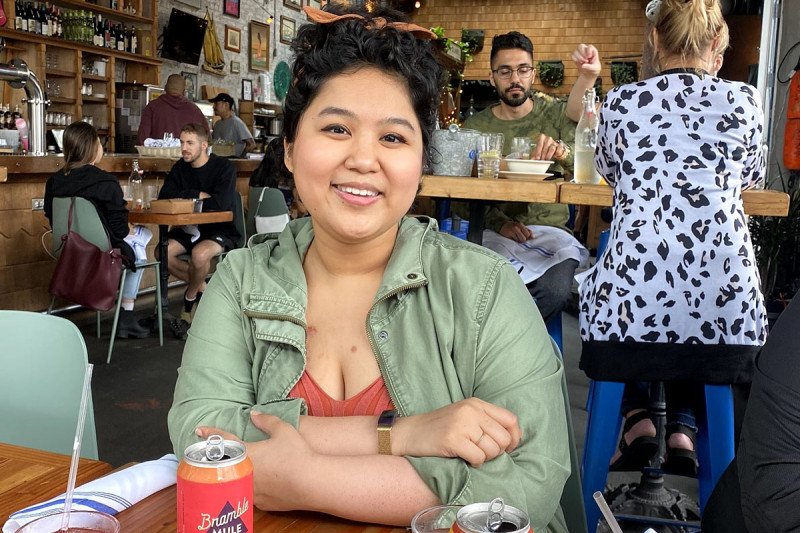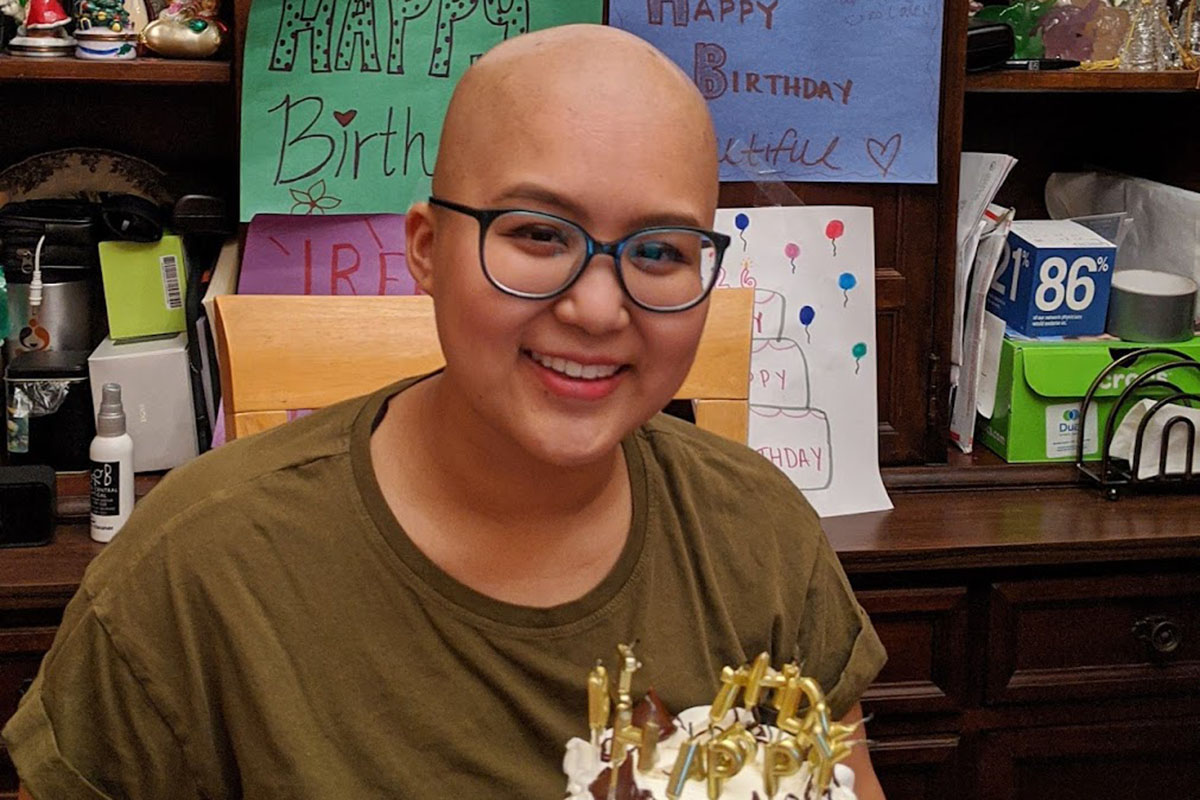
More than a year after being diagnosed with osteosarcoma, Irene Dimatulac is back in graduate school for speech pathology.
It was Valentine’s Day in 2020 when Irene Dimatulac learned she had bone cancer in her left knee. “I’d been having pain for a few years, but it finally got to the point of not being manageable,” says the avid rock climber and speech pathology graduate student, who was 25 years old at the time. “One of the things I remember feeling — aside from despair and feeling lost — was also a little bit of relief in finally knowing what was wrong with my knee.”
Irene had osteosarcoma, which is the most common kind of bone cancer. It primarily occurs in children and young adults and mostly affects the arms and legs.
‘We Felt Like They Were Ready for Us’
After Irene was diagnosed, she and her parents visited a few hospitals. “It felt kind of like dating, trying to find the right fit,” she remembers. “When we came to Memorial Sloan Kettering [Cancer Center], everyone was so personable. The teams immediately introduced themselves and started discussing what my treatment plans would be. I thought, ‘OK, I guess we’re staying here,’ because we felt like they were ready for us.”
MSK treats people with osteosarcoma from all over the world, and our doctors developed many of the treatments that are used today. MSK surgeons specialize in procedures that allow patients to maintain the function of their limbs.
Irene started her treatment the same week that New York City — and the rest of the United States — shut down due to the COVID-19 pandemic. Treatment would continue, but MSK had to limit visitors. The chemotherapy she received under the care of Paul Meyers and Emily Slotkin, both pediatric oncologists and sarcoma experts, was difficult. She was in the hospital 12 hours a day, four days a week. She had to be admitted more than once for high fevers.
In May 2020, orthopedic surgeons Meredith Bartelstein and Patrick Boland performed an operation that lasted nearly 10 hours, removing Irene’s left knee and part of her femur, which the cancer had infiltrated, and replacing them with prosthetic bone and joints.
After undergoing more than a year of standard treatment, Irene also was able to enroll in a program being led by Dr. Slotkin, which provides access to a drug that’s otherwise nearly impossible to obtain in the United States, called mifamurtide. The drug works by activating certain types of white blood cells that help the immune system kill cancer cells. Dr. Slotkin and the pediatric sarcoma team hope that the addition of mifamurtide to Irene’s treatment will help prevent the osteosarcoma from coming back.
Back to topA Home Away from Home

“I got to celebrate my birthday with all the people who had been making sure I got to that birthday,” Irene says about spending her 26th birthday at Memorial Hospital.
Although Irene was a young adult being treated at MSK Kids, she never felt out of place. Throughout her care, she took advantage of many of the support services that are available through MSK’s Adolescent and Young Adult (AYA) Program. She regularly met with psychiatrist Megan Gilman, who specializes in treating AYA patients. Through MSK’s Integrative Medicine Service, she received therapeutic massages from Rocco Caputo and did guided meditation with mind-body therapist Robin Hardbattle.
“Robin and Rocco and Dr. Gilman were the rocks that helped me remember who I am outside of being a cancer patient,” she says. “They kept reminding me of what I was working toward.” She also bonded with many of the nurses, who were about the same age as her. “MSK was like a second home,” she says. “I felt like I could relax and be myself.” She also enjoyed the food, including the special meal that was served for Christmas.
Last summer, a complication from her surgery required another operation, and she had to spend her 26th birthday in the hospital. Because COVID-19 had already prevented her from being able to have a party with friends and family, she says she felt “fortunate” to be able to spend it at MSK. “I got to celebrate my birthday with all the people who had been making sure I got to that birthday,” she says. “It just felt right to celebrate with my whole medical team and my community support system.”
Back to topComing of Age and Paying It Forward
Irene and a fellow MSK osteosarcoma patient — who she met through a special app for young adults that’s part of the Teen and Young Adult (TYA@MSK) Program — have started a Facebook group for other patients, called Cozy Cancer Corner for Young Adults. Through the TYA@MSK app, she also connected with other Asian Americans who were close to her in age. “We could relate to each other about cultural similarities that are unique to immigrant families,” she says. “There was always someone on the app for me to connect with.”
She had a final surgery in June 2021 and is still doing physical therapy, but has finished all of her planned treatment, including mifamurtide. She hasn’t resumed rock climbing yet, but she’s back in graduate school for speech pathology — she had just started her program when she was diagnosed and had to take time off.
Irene expects to graduate from Teachers College at Columbia University in the spring of 2022. She wants to have a custom stole made for her graduation ceremony, featuring the Filipino flag and the MSK logo. “My heritage and MSK have played and will continue to play a huge role in my success,” she says. She plans to be a clinical speech therapist and dreams of living in Hawaii someday.
“My cancer treatment has been a huge part of my coming of age,” Irene says. “I know that this time and the people that have supported me in my treatment will continue to play a huge role in my success, in school, and in my adulthood.”
- MSK has a high level of expertise in treating osteosarcoma, a type of bone cancer that usually affects children and young adults.
- MSK’s Adolescent and Young Adult Program provides support for teenagers and young adults who have been diagnosed with cancer.
- A combination of cutting-edge medical care and emotional support can help teens and young adults with cancer resume their regular lives after treatment.